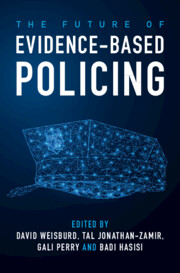Book contents
- The Future of Evidence-Based Policing
- The Future of Evidence-Based Policing
- Copyright page
- Contents
- Figures
- Tables
- Contributors
- Editors
- 1 The Future of Evidence-Based Policing
- Part I Taking Stock of Evidence-Based Policing
- Part II The Evidence for Evidence-Based Policing
- Part III Innovations in Tools of Evaluation and Assessment
- 8 The Role of Randomized Experiments in Developing the Evidence for Evidence-Based Policing
- 9 The Potential Contribution of Subjective Causality to Policing Research
- Part IV Challenges to the Implementation of Evidence-Based Policing
- Part V The Practitioner’s Perspective
- 17 Conclusions
- Index
- References
9 - The Potential Contribution of Subjective Causality to Policing Research
The Case of the Relationship between Procedural Justice and Police Legitimacy
from Part III - Innovations in Tools of Evaluation and Assessment
Published online by Cambridge University Press: 01 June 2023
- The Future of Evidence-Based Policing
- The Future of Evidence-Based Policing
- Copyright page
- Contents
- Figures
- Tables
- Contributors
- Editors
- 1 The Future of Evidence-Based Policing
- Part I Taking Stock of Evidence-Based Policing
- Part II The Evidence for Evidence-Based Policing
- Part III Innovations in Tools of Evaluation and Assessment
- 8 The Role of Randomized Experiments in Developing the Evidence for Evidence-Based Policing
- 9 The Potential Contribution of Subjective Causality to Policing Research
- Part IV Challenges to the Implementation of Evidence-Based Policing
- Part V The Practitioner’s Perspective
- 17 Conclusions
- Index
- References
Summary
Questions of causality are central to evidence-based policing (EBP), and have been occupying policing scholars in numerous areas. Experiments are considered the “gold standard” for determining causality, but they are not without limitations and are not always feasible. The present chapter explores the potential contribution of “subjective causality” to policing research. Subjective causality is a complementary, qualitative approach to establishing causality, in which relationships are examined and causality is determined through the subjective lens of the individual. Such an explicit approach to causality is uncommon in qualitative research in policing, and could assist in overcoming some of the challenges of the field. In this chapter we demonstrate how subjective causality can contribute to policing by focusing on an area where establishing causality is receiving particular attention: the presumed effect of police-provided procedural justice on police legitimacy. We use in-depth interviews with protestors who participated in “Occupy Israel” demonstrations in 2012 to explore how qualitative data can be used to identify the subjective, causal relationships that individuals make in their own minds between procedural jusice and legitimacy. We also discuss the applicability and potential contribution of this method to policing research more generally.
Keywords
- Type
- Chapter
- Information
- The Future of Evidence-Based Policing , pp. 170 - 190Publisher: Cambridge University PressPrint publication year: 2023

